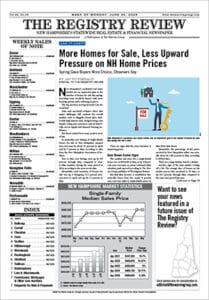The New Hampshire House voted down a bipartisan bill meant to make it easier to build housing in the state, in a 188-173 vote May 2 that kills the legislation for the year.
Proponents of Senate Bill 538, known as the “HOMEnibus,” argued it would help dislodge barriers to housing development and give cities and towns new tools to increase housing units.
The latest version of the bill allowed cities and towns to create “office conversion zones,” within which developers could get property tax breaks to convert commercial real estate buildings into residential housing. It also allowed towns and cities to speed up changes to the zoning code: The bill allowed residents to empower their local councils or boards of selectmen to pass new zoning codes; currently zoning codes may be changed only once a year at town meeting. That empowerment of local officials would need to be approved by the town via a warrant article.
And the bill would require that town and city planning boards consider alternative parking options when deciding whether to approve or deny a new housing development. That would allow developers to propose housing projects that don’t include new parking lots for residents but utilize existing public or private lots; the bill would require the planning board to seriously consider those proposals.
The bill passed the Senate unanimously. But a group of 170 Republicans and 18 Democrats voted to kill the bill in the House Thursday. Voting against that motion were 165 Democrats and seven Republicans.
To housing advocates, the bill would have helped interested towns incentivize housing development and speed up the process, at a time when many businesses are struggling to find workers due to low housing availability.
Housing prices and rents are at record highs, and the state’s rental vacancy rate is below 1 percent, a number that housing experts say is far below the recommended rate of 5 percent. And homelessness in the state increased by 30 percent from 2020 to 2022, according to the state’s annual point in time count and the latest report from the New Hampshire Coalition to End Homelessness.
“A few simple adjustments to our zoning and planning procedures would encourage a modest increase in this desperately needed supply,” said Rep. Laurel Stavis, a Lebanon Democrat.
But opponents took issue with each of the bill’s parts. Rep. Len Turcotte, a Barrington Republican and chairman of the Municipal and County Government Committee, argued that the Legislature should not allow towns to give property tax breaks for housing, because doing so could just raise property taxes for other businesses and homeowners in town. Turcotte argued the bill could allow town officials to give unfair tax favors to favored developers.
Turcotte also opposed empowering local government officials to make changes to zoning codes without town meeting approval.
And he and others opposed the part of the bill requiring local boards to consider alternative parking solutions, noting that it “would actually require zero parking to be part of any development proposal,” which he said could lead to parking congestion in towns.
Rep. Diane Pauer, a Brookline Republican, said the office conversion zones could have the effect of forcing businesses to move out if their landlords decided to convert their office buildings to apartments instead.
An extended version of this story first appeared in the New Hampshire Bulletin. This excerpt is being republished here under a Creative Commons license.

